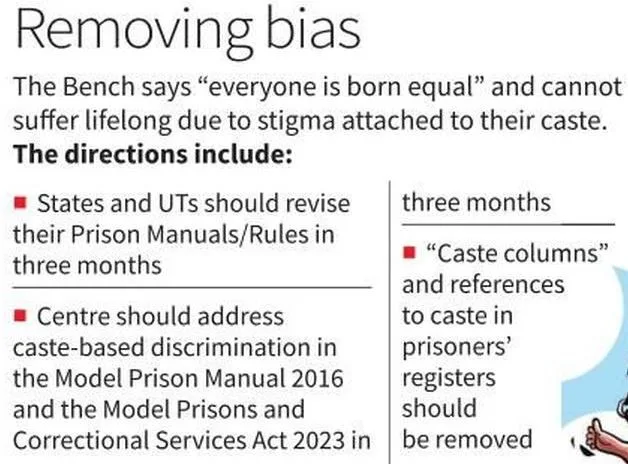Syllabus: GS2/Polity and Governance
Context
- The Supreme Court declared that caste-based discrimination of prisoners oppressive to fundamental human dignity and personality.
About
- The SC had found that prison manuals in more than 10 States, including Uttar Pradesh, West Bengal, Odisha, Maharashtra, Tamil Nadu, and Kerala, contained provisions which sanction discrimination and forced labour in prisons on the grounds of caste.
- The existing prejudices in prison rules are with respect to division of manual labour, segregation of barracks and provisions that discriminate against prisoners belonging to denotified tribes and habitual offenders.
- Menial jobs in jails are not allotted to prisoners, who belong to a specific caste that is not accustomed to them.
- The separation of Thevars, Nadars, and Pallars in different sections of the Palayamkottai Central Jail in Tamil Nadu was one such instance of caste-based segregation of barracks.
- Even the Union government’s Modern Prison Manual of 2016 and the Model Prisons and Correctional Services Act of 2023 variously rate “habitual offenders” who are mostly members of denotified tribes.
- These laws assign kitchen duties and cooking in prisons on a caste and religious basis. They continue to allow caste-based privileges in prisons.
Key Highlights of the Judgement
- SC referred to Article 15(1) of the Constitution which enshrines the fundamental right against discrimination.

- SC mentioned that if the state itself discriminates against a citizen, then it is discrimination of the highest form.
- SC held that discrimination among prisoners and distribution of work on the basis of caste amounted to untouchability, which is forbidden under Article 17 of the Constitution.
- Degrading labour and oppressive practices violate the right against forced labour under Article 23 of the Constitution.
- Prison manuals, by treating members of the denotified and wandering tribes as “born criminals” and habitual offenders, re-affirm colonial caste-based discrimination.
- The court declared all loose references, not statutorily backed, to ‘habitual offenders’ in prison manuals as unconstitutional.
- It also ordered the district legal services authority and the board of visitors formed under the central model prison manual to jointly conduct regular inspections to identify discriminatory practices prevailing in jails.
Source: TH
Previous article
5 New Languages Granted the Classical Language Status